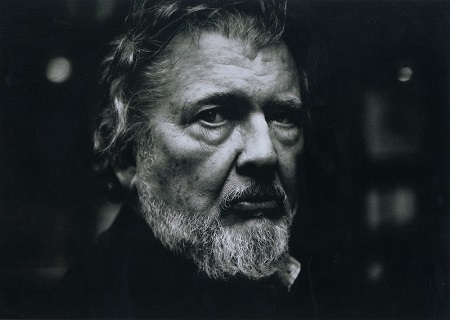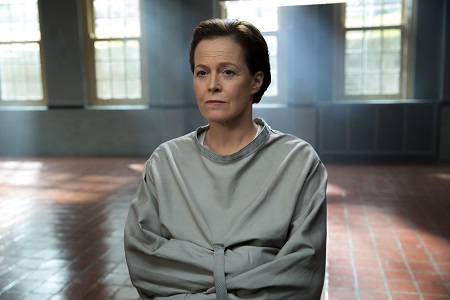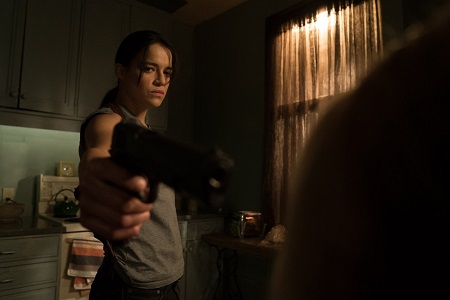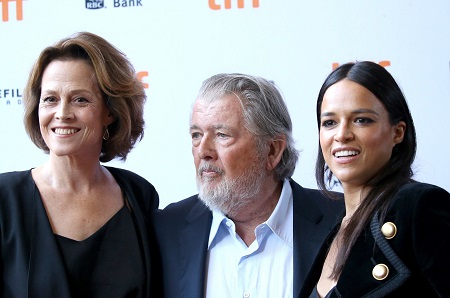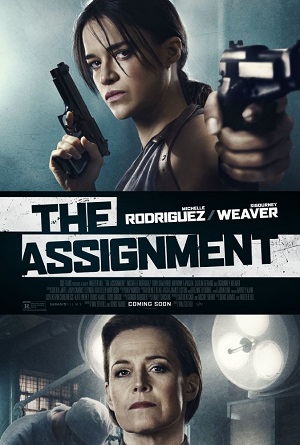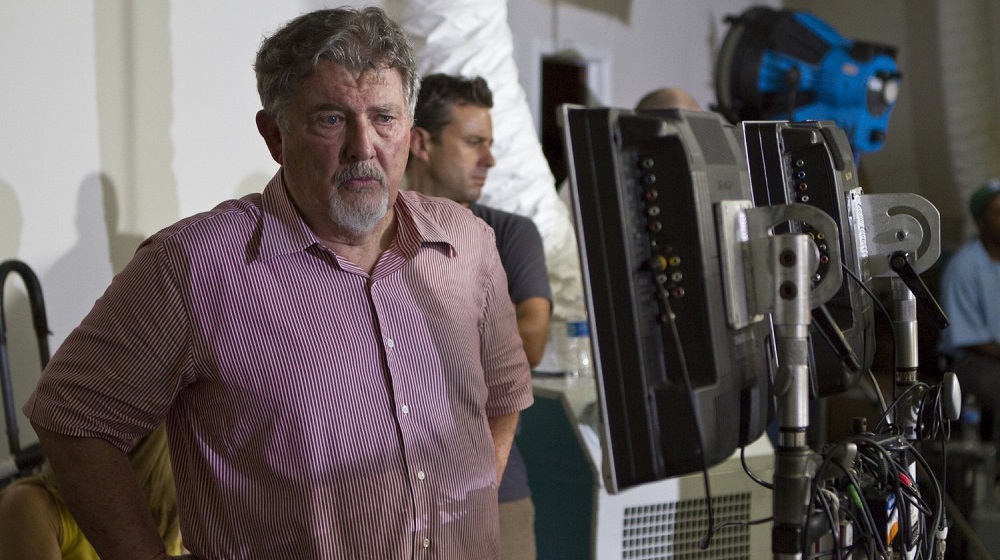
“The Assignment” – Interview with Walter Hill
by Sara Michelle Fetters - April 7th, 2017 - Interviews
Reinforcing Theory
Legendary Director Walter Hill Courts Controversy with Gender-Bending Noir Thriller The Assignment
I am a Transgender woman. It’s not something I talk about in great detail, mainly because I’m a reasonably private person and I feel like my work as a writer and a film critic should speak for itself devoid of labels or preconceptions. I just like to keep my personal life somewhat separate from my professional one, and while I’m not against talking about who I am and the journey I’m on, I just don’t think it should be the primary element making up how the world views either me or my work.
When dealing with a film like Walter Hill’s The Assignment, maintaining that distinction is unavoidably impossible. The movie is a dark, dingy noir thriller about a professional killer, Frank Kitchen (Michelle Rodriguez), abducted by a brilliant if psychologically unstable scientist, Dr. Rachel Kay (Sigourney Weaver), and then given a forced gender reassignment surgery as punishment for assassinating her brother years earlier. It’s a seedy, obviously exploitive premise, and one that could also be viewed as dangerously transphobic, and as such watching the film devoid of my own personal experiences was pretty much hopeless.
Gifted the opportunity to speak briefly with the legendary filmmaker on the telephone, Hill the driving force behind such unabashedly pugnacious and masculine classics like The Driver, The Warriors, Southern Comfort, The Long Riders and 48hrs., the director seemed to be seemingly as excited to talk to me as I was to chat with him. “I’m so happy you called!” he exclaimed with hearty exuberance. “I haven’t had the chance to talk about the movie with a Transgender viewer. This is very exciting, I hope that’s all right to say.”
As I didn’t see any other way to have this conversation with the filmmaker other than to be totally open and upfront as to where I was coming from, I had no problem whatsoever discussing The Assignment with him coming from that base of knowledge and mutual respect. Additionally, I had to admit to Hill how initially nervous I was to watch the movie considering the uncomforting nature of the major plot elements, my affinity for his filmography and fondness for down and dirty grindhouse cinema notwithstanding. All of which added to my being quite surprised just how progressive and open-minded his and co-writer Denis Hamill’s script proved to be as it related to issues of gender identity, a laudable trait I never could have anticipated before watching.
“That doesn’t surprise me at all,” he admits, referring to my initial nervousness to view his film. “Before the movie was even made, it immediately came under attack, as if I would make a film that was exploitive or negative about the Transgender situation. We live in gender fluid times. Especially compared to the world and the country I grew up in, and I think that’s terrific, and I have said all along to anybody who would walk into the bar and have a drink with me that the movie actually reinforces Transgender theory, at least as I understand it, which is we are who we are inside our head. That’s the determining factor.
“Frank Kitchen, he’s Frank Kitchen. That does not change. You start the movie, and I do realize it’s very much in comic book shorthand, but he’s a guy and he loves being a guy, and then he goes through a forced genital alteration which is very different than going through a traditional gender reassignment process. After, he remains a guy. Because that’s who he is.
“As far as I understand it, that perfectly reinforces Transgender theory, which I whole-heartedly support. And, really, that’s another thing. And I don’t know how you could watch any of my films, as dark as some of them might be, and ever think I’d want to go out hurt people who have gone through a difficult process in their lives and have hopefully gone on to a happier state. I would never want to exploit that, and that isn’t the movie that I feel like I made. It’s a little disheartening to think some people would think that without even taking a look at the film.”
That, in my opinion, is the crucial point. While some of what he says is admirably progressive and ahead of the societal curve, especially for a grizzled, 75-year-old filmmaker known for tough guy thrillers like Extreme Prejudice, Wild Bill and Trespass, other aspects of his statement do feel as if they’re being said by a man set in his ways and unable to understand why some would take offense at the narrative scenario his newest film toys with. But the key is that they should still see The Assignment in order to enter the discussion, not doing so adds nothing to the debate but clueless angry noise not worth paying attention to.
What I discovered is that, by and large Hill is spot-on in regards to his assertion how positively his story portrays the Transgender experience. Dr. Kay might be a psychopath, but she still cares for her patients with a level of understanding and commitment that’s startling. Halfway through the movie, she delivers a speech (one that’s admittedly rather pretentious in its psycho-babble obnoxiousness, it must be said) where she explains the psychological and physical aspects of the Transgender journey in exhausting minutia. This is a blunt discussion that adds an unforeseen layer to the film, and as such paints a clear picture as to why Frank Kitchen responds to his traumatic disfigurement as he does, the killer holding on to his masculinity even as his external physical gender has been permanently altered.
“I admit I got on the internet so I could sound literate as far that aspect of the film was concerned,” admits Hill. “I honestly did not do a lot of research. I went with my gut. The movie posits a doctor who has lost her license who is also an intellectual, is narcissistic and is a rather uber-mensch type personality. I always said her personality was modeled in Gore Vidal, who I knew a bit, and I think he’d be amused by that statement. But, this woman has been discriminated against, blocked and had her ambitions forcibly held in check for no other reason than she’s a woman. She takes that personally. She’s also obviously insane. But she still cares for her patients. She still understands them. She has done her homework, she knows the research and she continues to be at the forefront of her chosen field, even without a license. I needed that to come through when she’s talking about her Transgender patients and why Frank Kitchen is not Transgender even after what she’s done to him.
“This allows [Dr. Kay] to be juxtaposed against this criminal person who is from the bottom of the underclass, a Darwinian survivor from the streets, and the movie becomes this saga of twin avenues of revenge both characters see before them. The movie, I think, doesn’t turn either one of them into a saint, but I also think the audience gets a sense of sympathy towards both characters to some degree. They’re both chastened by the process of going against one another. What’s the old phrase? They’re both sadder but wiser. She comes to grips with her principals and she’s going to live her life, even in the remarkably constrained circumstances she finds herself in because of her criminal acts, staying true to her intellectual beliefs. He’s going to move on and still use his lethal skills as he moves forward in his life, in effect also staying true to his personality even if his body has been changed against his will.
“That was always the idea. Making a statement about the Transgender experience, that honestly never entered my mind. To go back to what you were saying at the start, I never wanted to get into answering any of the questions people were asking as we were making the movie. I felt that the movie would be my answer.”
All of which allows the film to explore a form of duality anyone familiar with Hill’s work will find instantly recognizable, he’s just put a type of spin on it this time around that’s guaranteed to raise a few eyebrows. “In general media, I realize that I’m not page one material,” he says with a friendly laugh. “And I imagine there are many wanting to speak with me more because of the film’s subject matter more than they do for any other reason. But in the modest corner that I am in as a filmmaker, I’ve always been pleased to be referred to as a genre director or as an action director. I like action director thing because I think it sounds so cool, action director Walter Hill, but the truth is I’ve always tried to make these things a little more complicated than straight-ahead genre films. I don’t think I’ve always succeeded at that, I have had my missteps, but I always make the attempt, especially as it concerns the complexity and duality of the characters.
“Most genre films, characters respond to narrative. I think in most of my films, the narrative deals with the characters first. They push the narrative. They’re the driving force. I like characters and I want them to be interesting and complex. It’s their story. They should be worth spending time with.”
It’s at this point where our interview goes off the rails a little, Hill justifiably curious to know how I felt about the internal elements inside his movie, eager to know if there was anything I found objectionable or tone-deaf. Unlike so many who ask questions of a Transgender person, he isn’t interested in the ins and out of my transition, doesn’t ask objectionable questions as to my present physical status or where I’m at in my journey. Instead, he was interested in the psychology of the transition, wanting to know how my personal perspective influenced my watching of the film.
“There’s a lot of irony in the movie,” he attempts to explain. “But I don’t think there’s anything mean-spirited. At least, that was not the intent. But, you’re a part of this. You know more about the subject than I ever will. As I mentioned, you’re the fest Transgender person I’ve talked to about the film. I’d really like to know your thoughts.”
It’s weird being put on the spot like that. I didn’t want to admit I was disappointed in The Assignment, that I sadly found it lacking as a thriller and that many of its components didn’t work near as well as I hoped they would. But I was still excited by the movie, happily inspired by the way it spoke so clearly and urgently about the Transgender experience. While certain elements made me uncomfortable, while what happens to Frank Kitchen is abhorrent, that did not diminish the authenticity driving the conversation as it pertained to gender identity, reassignment surgery and the social and medical obstacles that face male and female Transgender persons alike. In other words, Sleepaway Camp or Dressed to Kill Hill’s film most decidedly is not, at least as far as how it understands Trans issues, and while entertainment value was a different discussion entirely, this was still a major plus to my way of thinking.
But while I was never offended by the film, I also couldn’t help but wonder what might have been possible had the filmmaker cast a Transgender actor in the role of Frank Kitchen. As terrifically brave as Rodriguez’s performance proved to be, as great as the actress is as the character, the idea of a female-to-male or male-to-female actor challenging themselves in order to portray him was an idea I could not get out of my head.
“First, I’m so glad you mentioned how brave Michelle’s performance is,” says Hill. “It’s so true. I asked a lot of her, asked her to go places she wasn’t sure she could get to. I think she’s gutsy as hell and delivers a terrific performance.
“To answer your question, I have to confess the answer to whether or not we thought about hiring a Trans actor is sadly no. It never entered our mind. The pressure to get the movie financed was so great, and the only way to get the money was to have name casting. It was that simple. This was still, which I’m sure you noticed, a very moderately budgeted film, and we shot it in a little over 20 days. This was not a big Hollywood production in any respects whatsoever.
“But even then, I had to make sure I had names above the title or else we’d never get the money to make the movie. These aren’t huge stars, but Michelle and Sigourney are obviously very well known, and having them involved ensured we’d be able to get financing. To have open casting I would have had to have made the movie for a fraction of the cost and shot it in something like six days, and considering the complexities of the script that would have been impossible. I couldn’t have done it.
“So did I think about it? No. I did not. Would I have loved to have had open casting? Would it have been interesting to see if a Transgender actor would have auditioned for the role? Yes. It would have been. But it just wasn’t in the cards. The movie never would have been made.”
“We did talk about Frank being played by a male actor,” adds the filmmaker after a moment or two of introspection and thought. “That was something we pondered. The thing was, the more I thought about it, the more I realized the performance would be more about the makeup and the prosthetics than it would be about the performance. That didn’t sit right in my head.”
As disappointing, if equally unsurprising, as this answer proved to be, that did not mean Hill didn’t think outside of the box he and Hamill had initially written for themselves. “In the original version of the script, Dr. Kay was a man,” he proclaims. “When I made the decision to flip that over, the film really became clear in my head. I just thought that was more interesting, and as soon as I made the switch Sigourney was the first person I sent [the script] to. Thankfully, she saw in it what I’d hoped we’d written, that it went beyond the usual mad doctor stereotypes, even found in comic book form, and I was very happy when she decided to come aboard. We have a long history together, of course, having made Alien [Hill was one of that film’s producers and has been a vital member of the franchise’s creative team ever since], and she to my mind was perfect for this particular character.”
With our time running out, I realize I could keep talking to Hill for much longer than our allotted 15 minutes, this conversation proving to be a fascinating and insightful back-and-forth I didn’t want to end. While I wanted The Assignment to be better than it was, the fact it led to such a dynamic, complicated discussion brought a gigantic smile to my face. I was glad I watched the movie and even happier I’d been given the opportunity to speak so candidly with its director, this open dialogue a refreshing revelation that had me looking at my own journey in ways I hadn’t in quite some time.
As for Hill, he has his own ideas as to what he hopes general audiences take away from the experience of watching The Assignment. “I think in our gender fluid time this is a piece of entertainment that could possibly contain more for audiences to ponder than initially meets the eye,” he states plainly. “It’s an entertaining revenge story in a gender fluid environment, and I also think the acting is very good. Michelle, Sigourney, Tony [Shalhoub] and so many of the others all did a great job for me, and did so under not very easy circumstances.
“And, Michelle in particular, again I agree with you. I think this a very brave performance. She understood the character and his relationship to the narrative has so much to do with his body. Michelle unhesitatingly stepped forward and really went for broke. She’s a very vibrant personality, and I loved working with her. I love her. She and I slugged it out, and I respected her right away. If audiences were to look at Michelle in a new light after seeing her performance here, that would be great, too.”
– Interview reprinted courtesy of the SGN in Seattle
